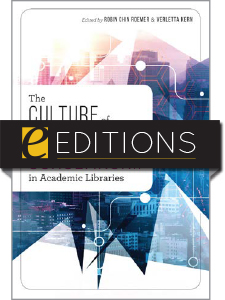
The Culture of Digital Scholarship in Academic Libraries—eEditions PDF e-book
The download link for this product can be found on the final confirmation screen after you complete your purchase, and may also be accessed from your Account Profile. For more information about ALA eEditions file types and how to view them on eReaders, desktop computers, and other devices, see this page.
Primary tabs
You don't need to be an ALA Member to purchase from the ALA Store, but you'll be asked to create an online account/profile during checkout to proceed. This Web Account is for both Members and non-Members. Note that your ALA Member discount will be applied at the final step of the checkout process.
If you are Tax-Exempt, please verify that your account is currently set up as exempt before placing your order, as our new fulfillment center will need current documentation. Learn how to verify here.
- Description
- Table of Contents
- About the authors
- Reviews
At the heart of digital scholarship are universal questions, lessons, and principles relating both to the mission of higher education and the shared values that make an academic library culture. But while global in aspirations, digital scholarship starts with local culture drawn from the community. Editors Chin Roemer and Kern invite you into their institutional workspace, the University of Washington, gathering voices from a range of positions that speak to the facets of digital scholarship. This mosaic of perspectives reveals the challenges, questions, and personalities that sit at the nexus of academic libraries and digital scholarship culture. Reflecting on UW’s approach, you’ll gain insights for your own institution on topics such as
- ways to create awareness of digital services through training;
- supporting students as creators of content;
- blending existing analog collections with ongoing digital initiatives using a media lab;
- creating a campus-wide, discipline agnostic, data repository service;
- how a popular digital storytelling workshop spawned digital scholarship across campus;
- digital scholarship consultations, viewed from an instructional technologist’s approach;
- the place of digital scholarship in the fabric of a revitalized urban community;
- four strategies for teaching research skills within an online-only bachelor’s degree program; and
- assessment findings from focus groups, surveys, digital pedagogy projects, and Omeka case studies.
By thoroughly exploring a single institution, this unique volume elucidates the many ways in which digital scholarship can express the values, priorities, opportunities, and challenges of the community’s intellectual and technical environment.
Introduction, by Robin Chin Roemer
Part I Values
Chapter 1 Public Scholarship, by Robin Chin Roemer
Chapter 2 Digital Citizenship: Teaching Research Identity and Accountability to Undergraduates, by Reed Garber-Pearson
Chapter 3 Scholarly Communications Outreach and Education, by Maryam Fakouri
Part II Practices
Chapter 4 Assessment at the University of Washington Libraries, by Verletta Kern
Chapter 5 Digital Storytelling, by Perry Yee and Elliott Stevens
Chapter 6 Stewardship, by Elizabeth Bedford
Part III Environments
Chapter 7 Learning Technologies, by Beth Lytle
Chapter 8 Data Services, by Jennifer Muilenburg
Chapter 9 Media Services, by John Vallier and Andrew Weaver
Chapter 10 The Urban Serving University, by Justin Wadland and Marisa Petrich
Conclusion: The Culture of Digital Scholarship Continued, by Verletta Kern
- Appendix A: Teaching Community Accountability Worksheet
- Appendix B: Jigsaw Activity
- Appendix C: Activity in Pairs: Using Yourself as an Information Source
- Appendix D: Extra Credit Assignment: Meet with a Librarian
- Appendix E: Focus Group, Interview, or Survey Questions
- Appendix F: Template: Message for Subject Librarians on Digital Pedagogy Study
- Appendix G: UW Libraries Research Data Services Unit Communications Plan, 2014
About the Editors and Contributors
Index
Robin Chin Roemer
Robin Chin Roemer is the head of Instructional Design and Outreach Services for University of Washington Libraries, where she has worked since 2013. She previously worked as a communication librarian at American University in Washington, DC. She holds a BA and MA in English, and an MLIS from the University of Washington. Her publications include the 2015 handbook Meaningful Metrics: A 21st Century Librarian’s Guide to Bibliometrics, Altmetrics, and Research Impact, as well as numerous professional articles on altmetrics and digital pedagogy.
Verletta Kern
Verletta Kern has served as digital scholarship librarian at the University of Washington Libraries since 2016. She has presented on digital scholarship topics at venues such as the Digital Library Federation and the Humanities, Arts, Science, and Technology Alliance and Collaboratory (HASTAC). She received her MS in Library and Information Science from the University of Illinois.
"This is a good sourcebook for institutions that are new to digital scholarship or are looking to refresh how they approach digital scholarship ... Recommended for academic librarians looking for assignments and ideas that could be applied toward their own programs."
— Catholic Library World
"Each contributor to this title brings a valuable perspective on how an academic library can support digital scholarship. The chapters focus on different aspects of the services offered by UW Libraries, and similar themes unite the text and emphasize the robust programming offered to their users. The insights may be readily transferred to other institutions."
— Technical Services Quarterly
"Taken individually, the book’s chapters provide lessons on service design and implementation that may be of value to institutions looking to expand their existing digital scholarship offerings or to institutions that do not have a formalized digital scholarship practice ... Experienced digital scholarship practitioners will see reflections of their existing practices in the UW experience, and librarians who are looking to establish or grow a digital scholarship culture will find individual chapters as a source of inspiration and further exploration during the planning and development of specific digital scholarship services."
— College & Research Libraries


